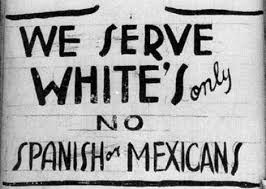When I asked South African playwright Athol Fugard his opinion of race relations in the United States, he replied:
Man! It’s not as easy to identify the enemy here, as it is back home, which makes the struggle vastly more complicated. At home the enemy is immediately identifiable — simply because of the institutionalization of racism. Whereas in America the enemy wears many disguises.
That was more than 30 years ago. Well, the disguises have come off, and now a white racist ideology in the U.S. has been institutionalized — or as some might say, re-institutionalized.
“Whoever thought the Ku Klux Klan would endorse a major-party candidate?” says political historian Allan J. Lichtman, who correctly predicted the election of Donald Trump. Furthermore, with Trump headed to the White House, Lichtman reminds us:
If the Republicans control everything, it will almost be as if Obama didn’t exist for eight years. They can wipe out every part of his legacy: climate policy, immigration reform, liberal jurisprudence, the Affordable Care Act.
“But contrary to all the pundits,” Lichtman adds,
Donald Trump won not because of Donald Trump and his campaign, but despite them. Hillary Clinton wasn’t to blame for this loss. The Democrats are already a shattered party. They hold nothing. They would further undermine themselves and pulverize themselves if they blamed Hillary Clinton for this loss. She didn’t do anything wrong. She won the three debates. But she was up against a bigger force.
What constitutes that “bigger force”? The usual suspects — fear of immigration, hostility to free trade, repudiation of elite Washington insiders, economic despair, so forth and so on. But let’s not kid ourselves.
R-a-c-i-s-m tops my list of suspects. It’s what underpins all those issues, in my humble opinion, and put the American personification of Brexit over the top.
Postscript: Columbia law professor Tim Wu thinks Trump won because, through the media’s “free advertising” of campaign coverage, he was able to amplify his message “like many fascist leaders in the past” — not that his views are comparable to theirs, oh no, who could possibly think that? But like them he understood “the best way to attract attention and inspire intensity in your audience is to make them afraid.” He merely “tapped into the unconscious fears and hatreds of his supporters by overstating the danger the United States is in, and creating enemies much greater than reality supports.” I take the point, of course. Many others have made the same point. But those “unconscious fears and hatreds” certainly sound like r-a-c-i-s-m to me.
Jan Herman


[…] Postscript: Crossposted at IT: International Times. […]
Pingback by Straight Up | Herman | Racism and the ‘Bigger Force’ on 23 November, 2016 at 3:27 pm